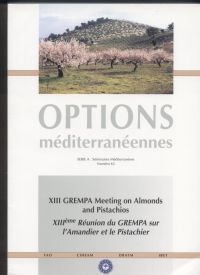| Article précédent | p. 311-319 | Article suivant |
Characterization of almond varieties in irrigated and non-irrigated conditions
In Trás-os-Montes Region, almond orchards are usually planted in the dry soils of Upper Douro River Valley. Even so, they are traditionally cultivated under non-irrigated conditions, resulting in low and non-competitive production. This study aims to compare the physiological responses of five almond varieties ('Francolí', 'Ferragnès', 'Glorieta', 'Lauranne' and 'Masbovera') growing under non-irrigated and irrigated conditions and to find the specific leaf water potential value that maximizes the photosynthetic productivity. Under irrigated conditions, all the studied cultivars showed high photosynthetic potentials, with average daily rates in a range of 6.8 to 7.7 mmolCO2 per m2 per s. Under non-irrigation, plants showed a strong photosynthesis reduction of 32, 42, 47, 51 and 58 per cent in 'Glorieta', 'Lauranne', 'Francolí', 'Masbovera' and 'Ferragnès'. This general reduction suggests the benefits of an adequate irrigation programme leaded by leaf water potential.
- [ Afficher ]
- [ Télécharger ]
- [ Exporter la citation ]
Vous pouvez télécharger la citation au format :
- [ Imprimer ]
-
Mots-clés
AMANDE, PHOTOSYNTHESE, POTENTIEL HYDRIQUE, RESISTANCE A LA SECHERESSECiter cet article
Gomes-Laranjo J., Coutinho J.P., Torres-Pereira J. Characterization of almond varieties in irrigated and non-irrigated conditions. In : Oliveira M.M. (ed.), Cordeiro V. (ed.). XIII GREMPA Meeting on Almonds and Pistachios . Zaragoza : CIHEAM, 2005. p. 311-319. (Options Méditerranéennes : Série A. Séminaires Méditerranéens; n. 63). 13. Meeting of the Mediterranean Research Group for Almond and Pistachio, 2003/06/01-05, Mirandela (Portugal). http://om.ciheam.org/om/pdf/a63/05600046.pdf



